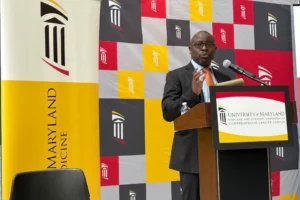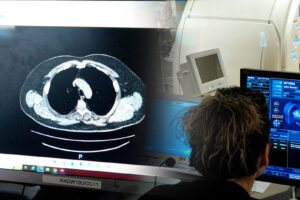Five UMB, UMCP Research Teams Receive $500,000 in MPower Seed Grants to Collaborate to Address COVID-19
Press Released issued by UMB and UMCP on 9/1/20
The Joint Steering Council of the University of Maryland Strategic Partnership: MPowering the State (MPower), a formal collaboration of the University of Maryland, Baltimore (UMB) and the University of Maryland, College Park (UMCP), has awarded funding to five multidisciplinary research teams to respond to the impact of COVID-19 in Maryland and beyond.
After a review and ranking of 50 submissions by faculty peer representatives from both UMB and UMCP, the Steering Council awarded $500,000 in funding to five teams: two to support vaccine development; one to develop a rapid testing method; one to study psychological factors of vaccine acceptance among African Americans; and one to explore the use of an artificial intelligence tool for delivery of child behavioral health services via telemedicine in rural communities.
The Steering Council issued the call for proposals to mobilize researchers at both institutions to bring solutions that would offer immediate action to address the COVID-19 pandemic and to prepare for future pandemics.
The request for proposals sought timely, impactful projects that would improve the health of Maryland residents by reducing the impact of COVID 19 through scientific, medical, public health, social, behavioral, or policy/legal approaches, or by supporting those most at risk or experiencing the greatest disparities in care.
Funding was offered from $25,000 to $100,000 per award, for a duration no longer than 12 months.
The winning teams capitalize on the research expertise of UMB and UMCP, and showcase collaboration across multiple colleges and schools. Teams consisted of faculty from UMCP’s College of Arts and Humanities, School of Public Health, and College of Computer, Mathematical and Natural Sciences, partnering with researchers from UMB’s schools of medicine, pharmacy, and nursing.
A look at the winning projects:
- Predicting
and improving COVID-19 vaccine acceptance among African Americans during
the Coronavirus pandemic.
PROJECT SUMMARY:
As the world anxiously
awaits a safe and effective COVID-19 vaccine, there is growing concern about
vaccine hesitancy fueled in part by misinformation. The proposed research seeks
to understand why African Americans, who suffer disproportionately from the
adverse health and economic impact of the pandemic, might accept or reject the
anticipated COVID-19 vaccine. The goal of this project is to develop and
evaluate communication messages that could be used in a broader health
promotion effort to improve COVID-19 vaccine acceptance among African
Americans. Findings of this research will help address COVID-19 health
disparities and inform pandemic vaccine communication across ethnic/racial
groups.
FUNDING: $98,432
- Development of a COVID-19 vaccine based on the supramolecular assembly of SARS-CoV-2 structural proteins using a novel immunoadjuvant delivery system
PROJECT SUMMARY:
This project will generate novel vaccine candidates for SARS-CoV-2 which are urgently needed due to the COVID-19 pandemic. The team will utilize an interdisciplinary approach with advanced computational design tools and high resolution structural characterization to produce and optimize vaccine candidates based on the Spike glycoprotein, which is a critical target of the antibody response to SARS-CoV-2.
FUNDING: $100,000.
- A rapid point-of-care testing for SARS-CoV-2
PROJECT SUMMARY:
This innovative project aims to develop a point-of-care test that can rapidly and effectively detect infections of SARS-CoV-2 virus, which causes COVID-19. One of the challenges in preventing onward transmission of the virus is the lack of a simple, rapid, and affordable test. Without a rapid test, it is almost impossible to early identify infected cases and isolate them from the community. This study meets this urgent need in this public health crisis.
FUNDING: $100,000.
- Molecular Investigations of SARS-CoV-2 Spike Protein
PROJECT SUMMARY:
In infected cells, coronaviruses use host fat molecules to transport spike protein to the correct cellular compartment for progeny assembly. Researchers will use high-resolution imaging to discern atomic-level details of how host fat molecules modify the SARS-CoV-2 spike protein for transport. These architectural details will open avenues for computational screening of small molecules for inhibition of spike-fat interactions. This approach offers a potential means of therapeutic intervention in COVID-19 by inhibiting assembly and propagation of SARS-CoV-2 progeny.
FUNDING: $100,000.
- Developing an artificial intelligence tool to improve caregiver engagement for rural child behavioral health services
PROJECT SUMMARY:
The overall goal of this project is to study artificial intelligence based-technology strategies to help child behavioral health providers improve caregiver engagement in rural Maryland communities. With the recent pandemic, most of these services are provided “virtually” through videoconferencing platforms. The project will collect and analyze information from videotaped sessions (e.g. speech patterns, facial expressions) and assess the relationship between artificial intelligence measured engagement with provider and caregiver-reported engagement in care. The project will also investigate the association of social isolation with perceived caregiver engagement. This data could potentially be used to improve provider training and develop a tool that provides “real-time” feedback to providers on caregiver engagement.
FUNDING: $90,522.
For additional information on these projects, and to arrange researcher interviews, please call Mary T. Phelan, senior media relations specialist, UMB, at 443-615-5810 or email maryphelan@umaryland.edu.
About the University of Maryland Strategic Partnership: MPowering the State
The University of Maryland Strategic Partnership: MPowering the State is a collaboration between the state of Maryland’s two most powerful public research institutions: the University of Maryland, Baltimore (UMB) and the University of Maryland, College Park (UMCP). It leverages the sizable strengths and complementary missions of both institutions to strengthen Maryland’s innovation economy, advance interdisciplinary research, create opportunities for students, and solve important problems for the people of Maryland and the nation. Working together, UMB and UMCP achieve innovation and impact through collaboration. The University of Maryland Strategic Partnership Act of 2016 strengthened and formalized the structured relationship between UMB and UMCP, which began in 2012. The law deepens the alliance and energizes UMB and UMCP to pursue even greater transformative change and impact, far surpassing what each institution could do independent of each other.
About University of Maryland, College Park
The University of Maryland, College Park is the state’s flagship university and one of the nation’s preeminent public research universities. A global leader in research, entrepreneurship and innovation, the university is home to more than 40,000 students,10,000 faculty and staff, and 280 academic programs. As one of the nation’s top producers of Fulbright scholars, its faculty includes two Nobel laureates, three Pulitzer Prize winners and 59 members of thenational academies. The institution has a $2.1 billion operating budget and secures more than $1 billion annually in research funding together with the University of Maryland, Baltimore. For more information about the University of Maryland, College Park, visit www.umd.edu/.
About the University of Maryland, Baltimore
Founded in 1807, the University of Maryland, Baltimore is Maryland’s only public health, law, and human services university, dedicated to excellence in education, research, clinical care, and public service. UMB enrolls more than 6,800 students in six nationally ranked professional schools — medicine, law, dentistry, pharmacy, nursing, and social work — and an interdisciplinary Graduate School. The university provides more than $40 million each year in uncompensated care to Maryland citizens, and receives more than $667 million in extramural research funding annually. For more information about the University of Maryland, Baltimore visit www.umaryland.edu.



